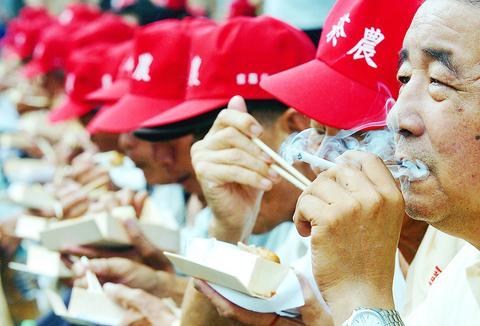Over 1,000 of the nation's tobacco growers yesterday petitioned for a raise in this year's government purchase volume of domestic tobacco, to compensate for investments they have already made.
"The nation's tobacco growers have poured money into necessary investment, such as soil preparation, for the more than 2,100 hectares of [tobacco] farmland across the country," Chen Man-hsiang (陳滿祥), representative of a local tobacco growers' association, told the Taipei Times in a telphone interview.

PHOTO: SEAN CHAO, TAIPEI TIMES
The growers hope the Executive Yuan will increase the buying volume of locally-grown tobacco leaves for this year from the previously agreed half of the output to 70 percent to make up for their investment, Chen said.
Tobacco farmers also hope the government will shorten its proposed three-year purchasing scheme to two years, as revenues from reduced production in the third year would not be even enough to cover the reaping costs, Chen said.
Switch crops
The Cabinet decided last month to continue buying locally-grown tobacco leaves and lowering the purchase volume over the next three years. The Cabinet also instructed the Council of Agriculture to help the tobacco growers switch from tobacco to other crops.
According to the government's plan, this year it will purchase about 274.5 million kilograms, or roughly half the volume it bought last year. Next year, the government will buy 20 percent less in volume than this year's amount, with the same reduction in 2006.
Extra expenses
The state-run Taiwan Tobacco and Liquor Corp (TTL,
"[The policy makes] us incur an extra NT$400 million of inefficient expenses, at the same time as we're working to improve our spending efficiency, which has provoked resistance from employees," said TTL Chairman Morgan Hwang (
TTL's extra expenses won't deter it from its privatization process. By the end of next year the company expects that less than 50 percent of its shares will be government-owned. The extra expenses for purchasing could continue indefinitely, though, as the government will likely remain a large shareholder, Hwang said.
Hwang admitted that this could have a negative impact on the company's plan to get strategic investment from foreign-owned tobacco companies, and could decrease the company's share price.
The former tobacco and liquor monopoly has up to 20 million kilograms of tobacco inventory in the warehouse, which may not be consumed in the next five years, adding to the company's extra storage and manpower expenses, Hwang said.
TTL reported a pretax profit of NT$6.8 billion between January and last month and expects to create NT$10 billion this year, up 20 percent from last year, according to the company.

TAKING STOCK: A Taiwanese cookware firm in Vietnam urged customers to assess inventory or place orders early so shipments can reach the US while tariffs are paused Taiwanese businesses in Vietnam are exploring alternatives after the White House imposed a 46 percent import duty on Vietnamese goods, following US President Donald Trump’s announcement of “reciprocal” tariffs on the US’ trading partners. Lo Shih-liang (羅世良), chairman of Brico Industry Co (裕茂工業), a Taiwanese company that manufactures cast iron cookware and stove components in Vietnam, said that more than 40 percent of his business was tied to the US market, describing the constant US policy shifts as an emotional roller coaster. “I work during the day and stay up all night watching the news. I’ve been following US news until 3am

UNCERTAINTY: Innolux activated a stringent supply chain management mechanism, as it did during the COVID-19 pandemic, to ensure optimal inventory levels for customers Flat-panel display makers AUO Corp (友達) and Innolux Corp (群創) yesterday said that about 12 to 20 percent of their display business is at risk of potential US tariffs and that they would relocate production or shipment destinations to mitigate the levies’ effects. US tariffs would have a direct impact of US$200 million on AUO’s revenue, company chairman Paul Peng (彭雙浪) told reporters on the sidelines of the Touch Taiwan trade show in Taipei yesterday. That would make up about 12 percent of the company’s overall revenue. To cope with the tariff uncertainty, AUO plans to allocate its production to manufacturing facilities in

Six years ago, LVMH’s billionaire CEO Bernard Arnault and US President Donald Trump cut the blue ribbon on a factory in rural Texas that would make designer handbags for Louis Vuitton, one of the world’s best-known luxury brands. However, since the high-profile opening, the factory has faced a host of problems limiting production, 11 former Louis Vuitton employees said. The site has consistently ranked among the worst-performing for Louis Vuitton globally, “significantly” underperforming other facilities, said three former Louis Vuitton workers and a senior industry source, who cited internal rankings shared with staff. The plant’s problems — which have not

COLLABORATION: Given Taiwan’s key position in global supply chains, the US firm is discussing strategies with local partners and clients to deal with global uncertainties Advanced Micro Devices Inc (AMD) yesterday said it is meeting with local ecosystem partners, including Taiwan Semiconductor Manufacturing Co (TSMC, 台積電), to discuss strategies, including long-term manufacturing, to navigate uncertainties such as US tariffs, as Taiwan occupies an important position in global supply chains. AMD chief executive officer Lisa Su (蘇姿丰) told reporters that Taiwan is an important part of the chip designer’s ecosystem and she is discussing with partners and customers in Taiwan to forge strong collaborations on different areas during this critical period. AMD has just become the first artificial-intelligence (AI) server chip customer of TSMC to utilize its advanced